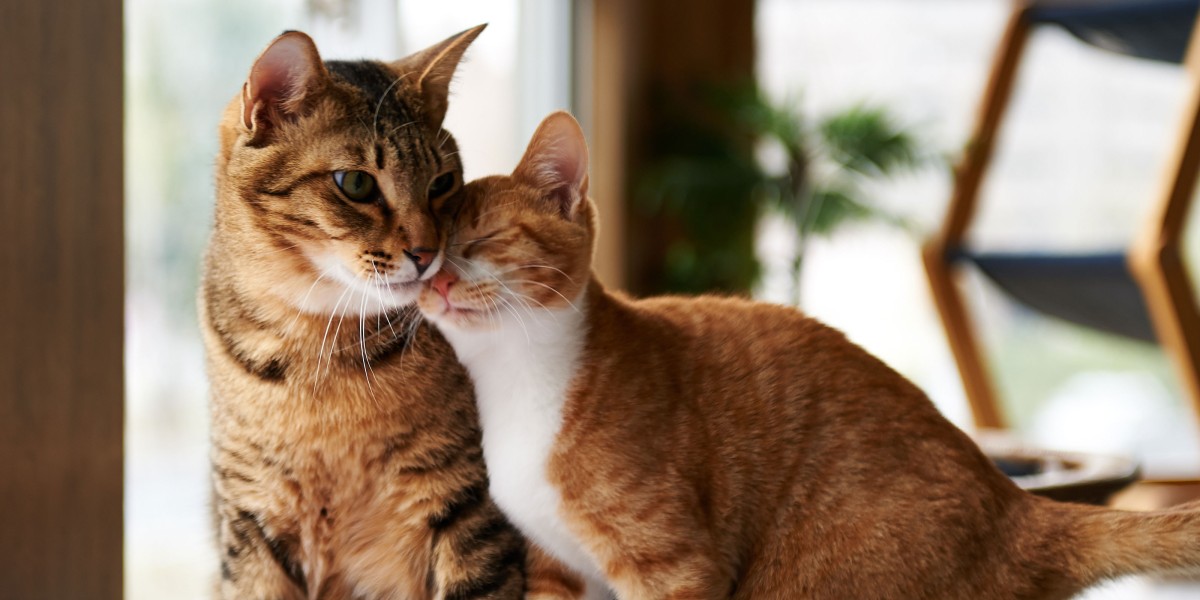Kitten socialization training helps young cats adapt to various environments and people. It builds confidence and reduces future behavioral issues.
Kittens are at a critical stage of development between two and nine weeks old. During this time, they are highly receptive to new experiences, making it the perfect opportunity for socialization. Proper training involves exposing them to different sounds, sights, and people in a positive way.
This process not only enhances their adaptability but also fosters a strong bond between the kitten and its owner. Socialized kittens typically grow into well-adjusted adult cats. They are less likely to develop fears or aggression towards unfamiliar situations. Investing time in kitten socialization is essential for a happy, healthy feline companion.
Table of Contents
The Importance Of Early Socialization
Early socialization is crucial for kittens. It shapes their personality and behavior. Kittens learn about the world during their first few months. Positive experiences create confident and friendly cats.
Benefits For Kittens
- Reduces Fear: Kittens exposed to different sounds and sights are less fearful.
- Improves Behavior: Socialized kittens tend to have better manners.
- Enhances Play: They learn how to play nicely with others.
- Builds Trust: Positive interactions foster trust in humans and other pets.
Long-term Impact On Behavior
Early socialization affects a kitten’s behavior as an adult. Socialized cats are more adaptable. They handle new situations with ease. Here are some long-term benefits:
| Behavioral Aspect | Socialized Kittens | Non-Socialized Kittens |
|---|---|---|
| Friendliness | More likely to greet people | May hide or run away |
| Playfulness | Engage well with toys | May be overly aggressive |
| Adaptability | Adjust easily to new environments | Struggle with changes |

Credit: www.westvillagevets.com
Identifying The Socialization Window
Understanding the right time to socialize kittens is essential. Kittens have a specific period when they are most receptive to new experiences. This period is known as the socialization window. Recognizing this window helps ensure your kitten grows into a well-adjusted cat.
Optimal Time Frames
The optimal time for kitten socialization spans from 2 weeks to 9 weeks of age. During this time, kittens are like sponges, soaking up new experiences. Here’s a breakdown:
| Age Range | Socialization Focus |
|---|---|
| 2-3 weeks | Introduce gentle handling and human interaction. |
| 4-5 weeks | Expose to various sounds and environments. |
| 6-9 weeks | Encourage play with toys and social interactions. |
Signs Of Readiness In Kittens
Recognizing when your kitten is ready for socialization is important. Look for these signs:
- Curiosity: The kitten explores surroundings.
- Playfulness: Engages in play with siblings or toys.
- Comfort: Shows comfort around humans and other pets.
- Vocalization: Meows or purrs when interacted with.
These signs indicate that the kitten is ready to learn. Early socialization leads to a confident and friendly adult cat.
Creating A Safe Learning Environment
Socializing kittens requires a nurturing space. A safe environment helps them learn. This section covers key elements for kitten socialization.
Designing The Space
Creating a perfect area for kittens is essential. Follow these steps:
- Choose a quiet room.
- Ensure the area is clean.
- Use soft bedding for comfort.
- Add toys for engagement.
- Include scratching posts.
Design the space to allow exploration. Kittens love to climb and hide. Make sure the environment is safe and free from hazards.
Minimizing Stress Factors
Stress can hinder learning. Reduce stress with these tips:
- Limit loud noises.
- Keep other pets away during training.
- Avoid sudden movements.
- Use calming scents like lavender.
Watch for signs of stress:
- Hiding
- Excessive meowing
- Loss of appetite
Address these signs quickly. A calm kitten learns better. Create a soothing atmosphere to enhance socialization.

Credit: www.lemon8-app.com
Introducing New People And Pets
Socializing your kitten with new people and pets is vital. It helps them grow into friendly and confident cats. Start this process early for the best results. Kittens are naturally curious, making them eager to meet others.
Gradual Exposure Techniques
Use gradual exposure techniques to introduce your kitten safely. This method reduces stress and fear. Follow these steps:
- Start with one person or pet at a time.
- Keep interactions short and positive.
- Use treats to create a happy experience.
- Allow your kitten to approach at their own pace.
- Gradually increase the time spent with new people or pets.
Consider using a safe space. A room with familiar scents helps your kitten feel secure. Always supervise initial meetings. This ensures safety for everyone involved.
Monitoring Interactions
Monitoring interactions is crucial during socialization. Watch for signs of stress or fear in your kitten. Look for:
- Hiding or running away
- Hissing or growling
- Tense body language
React quickly to any signs of discomfort. Calmly remove your kitten from the situation. Reward them with treats for positive behavior. This builds trust and encourages friendly interactions.
Keep a record of each interaction. Note what worked and what didn’t. This helps you adjust your approach in future introductions.
Handling And Touch Conditioning
Handling and touch conditioning are vital for kitten socialization. This training helps kittens feel safe and comfortable with human interaction. Early exposure to handling can lead to a well-adjusted adult cat.
Building Trust Through Touch
Trust is essential for any kitten. Use gentle, calm movements when interacting.
- Start by petting softly on the back.
- Gradually move to the head and chin.
- Observe their reactions. Stop if they seem scared.
Always reward positive behavior with treats. This creates a positive association with touch.
Desensitization Strategies
Desensitization reduces fear of handling. Here are some effective strategies:
- Introduce various textures. Use soft cloths, brushes, and toys.
- Vary your handling techniques. Hold, cradle, and gently squeeze.
- Practice short sessions. Gradually increase the time as they adjust.
Monitor their stress levels. Use treats to encourage calmness.
| Technique | Purpose | Duration |
|---|---|---|
| Gentle Petting | Builds comfort | 1-2 minutes |
| Texture Exposure | Familiarizes with different surfaces | 2-5 minutes |
| Handling Practice | Reduces fear | 5-10 minutes |
These strategies help kittens enjoy human touch. Keep sessions fun and stress-free.

Credit: www.purina.com
The Role Of Play In Kitten Socialization
Play is essential for a kitten’s development. It helps them learn important social skills. Through play, kittens explore their environment. They also build confidence and learn to interact with others.
Engaging in play helps kittens understand boundaries. They learn what behaviors are acceptable. Playtime also strengthens the bond between kittens and their owners.
Choosing Appropriate Toys
Selecting the right toys is crucial for effective socialization. Look for toys that mimic natural hunting. This encourages exploration and excitement. Here are some great toy options:
- Feather Wands: Great for interactive play.
- Laser Pointers: Stimulates chasing instincts.
- Catnip Balls: Engages their sense of smell.
- Soft Mice: Perfect for pouncing and carrying.
Choose toys that are safe and durable. Avoid small items that could be swallowed. Rotate toys regularly to keep playtime interesting.
Interactive Play Sessions
Interactive play sessions are vital for kitten socialization. Spend at least 15-30 minutes daily playing with your kitten. This helps them learn to trust you. Here are some tips for effective sessions:
- Use Variety: Change toys to keep things exciting.
- Follow Their Lead: Let the kitten dictate the pace.
- Encourage Engagement: Use movement to attract their attention.
- Be Patient: Allow them to explore and make mistakes.
Interactive play fosters a strong bond. It also reduces behavioral issues later in life. Remember to offer praise and treats during playtime.
Exposure To Various Stimuli
Socializing kittens means exposing them to different stimuli. This helps them grow into well-adjusted cats. Early exposure builds confidence and reduces fear. Let’s explore two key areas of this process.
Familiarizing With Sounds
Sounds play a big role in a kitten’s environment. Familiar sounds make them feel safe. Start with everyday noises:
- Vacuum cleaner
- Doorbell
- TV noises
- Children laughing
- Other pets
Introduce these sounds gradually. Play recordings at low volumes. Gradually increase the volume as they get used to it. Reward them with treats for calm behavior.
Introducing Different Textures And Surfaces
Different textures help kittens explore their world. This exposure aids their physical and mental development. Here are some textures to introduce:
| Texture | How to Introduce |
|---|---|
| Carpet | Let them walk and play on it. |
| Wood | Use a wooden board or floor. |
| Tile | Place them on a tiled surface. |
| Soft fabric | Use blankets or cushions. |
| Grass | Let them feel grass in a safe area. |
Encourage them to explore. Use positive reinforcement. This builds their confidence and curiosity.
Training Basics For Social Kittens
Socializing your kitten is essential for their development. This process helps them feel comfortable around people and other pets. Understanding basic training techniques will make a big difference. Here are some important areas to focus on.
Litter Box Training
Litter box training is one of the first steps. A clean, safe place encourages proper behavior. Follow these steps to make training easy:
- Choose the Right Box: Pick a box that fits your kitten.
- Use Quality Litter: Soft, unscented litter is best.
- Location Matters: Place the box in a quiet area.
- Show Them: Place your kitten in the box after meals.
- Reward Good Behavior: Use treats or praise when they use it.
Be patient. Kittens may take time to adjust. Keep the box clean to encourage use. If accidents happen, clean up without scolding them. This helps maintain trust.
Scratching Post Use
Teaching your kitten to use a scratching post is vital. This protects your furniture and keeps their claws healthy. Here’s how to introduce it:
- Choose the Right Post: Make sure it’s tall and sturdy.
- Location: Place it in a visible and accessible area.
- Encourage Use: Use catnip to attract them.
- Reward Them: Give treats when they scratch it.
- Redirect Behavior: If they scratch furniture, gently guide them to the post.
Monitor their scratching habits. Regularly check the post for wear. Replace it if needed. This keeps your kitten engaged and happy.
Dealing With Setbacks And Fears
Socializing kittens can be challenging. Setbacks and fears often occur. Understanding how to manage these issues is crucial. This section covers recognizing signs of fear and reversing negative associations.
Recognizing Signs Of Fear
Identifying fear in kittens is essential for effective training. Look for these signs:
- Cowering: The kitten hides or crouches low.
- Hissing: A clear warning sign of distress.
- Tail Position: A low or puffed-up tail indicates fear.
- Freezing: The kitten may stop moving altogether.
- Wide Eyes: Dilated pupils show anxiety.
Recognizing these signs helps you address fears quickly. Pay attention to your kitten’s body language.
Reversing Negative Associations
Negative experiences can create lasting fears. Follow these steps to reverse them:
- Identify Triggers: Observe what scares your kitten.
- Positive Reinforcement: Reward with treats for calm behavior.
- Controlled Exposure: Gradually introduce fear triggers in a safe space.
- Play Therapy: Use toys to build positive experiences.
- Patience: Allow your kitten to adjust at their own pace.
Reversing negative associations takes time. Consistency is key to rebuilding trust.
Socialization Beyond The Home
Socializing your kitten is crucial for their development. It prepares them for the world outside. Kittens need experiences beyond home to grow into confident cats. Socialization helps them interact well with people and other pets.
Adventures Outside
Taking your kitten outside can be fun and exciting. Start with short trips to help them adjust. Here are some tips for successful outdoor adventures:
- Use a harness and leash for safety.
- Choose quiet places to avoid overwhelming them.
- Let them explore at their own pace.
- Always supervise them closely.
Outdoor adventures can include:
- Backyards
- Parks
- Sidewalks
These outings help build their confidence. They learn to adapt to new sights and sounds.
Visits To The Vet
Vet visits are essential for your kitten’s health. Start early to make these trips less scary. Here’s how to make vet visits easier:
- Use a comfortable carrier.
- Take short trips to the vet for check-ups.
- Reward them with treats after each visit.
Regular vet visits help your kitten:
| Benefit | Description |
|---|---|
| Stay Healthy | Regular check-ups catch problems early. |
| Get Used to Handling | Helps them adapt to being touched and examined. |
| Learn Positive Associations | Creates a positive experience with new environments. |
These experiences help your kitten feel safe at the vet. Socialization beyond the home is vital for their well-being.
Maintaining Social Skills Into Adulthood
Social skills in cats are crucial. Kittens learn these skills early. Keeping these skills into adulthood requires effort. Consistent socialization helps adult cats thrive.
Continued Exposure And Play
Regular exposure to new experiences is key. Here are effective methods to maintain social skills:
- Daily Playtime: Engage your cat with toys.
- New Environments: Introduce different spaces.
- Visitors: Encourage interactions with friends and family.
- Training Sessions: Use clicker training for fun.
Rotate toys to keep playtime exciting. Use feathers, balls, and laser pointers. This keeps their interest alive and encourages playful behavior.
Socialization In Multi-cat Households
Multi-cat households require special attention. Here are tips for successful socialization:
- Safe Spaces: Provide separate areas for each cat.
- Gradual Introductions: Introduce cats slowly.
- Shared Play: Engage all cats in group play.
- Positive Reinforcement: Reward good interactions.
Monitor their behavior. Look for signs of stress or aggression. Create a calm environment for everyone. A happy home ensures cats remain social.
Troubleshooting Common Issues
Socializing kittens can be challenging. Some may show signs of aggression or shyness. Understanding these behaviors helps create a better environment.
Aggression Towards Other Animals
Aggression can stem from fear or lack of socialization. Here are some effective solutions:
- Slow Introduction: Introduce your kitten to other animals gradually.
- Safe Space: Provide a safe area for your kitten.
- Positive Reinforcement: Use treats to encourage calm behavior.
- Supervised Play: Always supervise interactions with other animals.
Monitor your kitten’s body language. Signs of aggression include:
| Behavior | Meaning |
|---|---|
| Hissing | Feeling threatened |
| Swatting | Defensive action |
| Arched back | Ready to fight |
Shyness Around Strangers
Shy kittens may feel overwhelmed by new people. Follow these steps to help:
- Gentle Exposure: Introduce your kitten to new people slowly.
- Positive Experiences: Allow visitors to offer treats.
- Quiet Space: Create a quiet area for your kitten to retreat.
- Patience: Give your kitten time to adjust.
Encourage socialization by inviting calm friends over. Avoid forcing interactions. Let your kitten approach at their own pace.
Frequently Asked Questions
At What Age Should Kittens Be Socialized?
Kittens should be socialized between 2 to 9 weeks of age. This critical period helps them develop positive interactions with people and other animals. Early socialization leads to well-adjusted adult cats. Focus on gentle exposure to various environments and experiences during this time for best results.
Is 4 Months Too Late To Socialize A Kitten?
Four months is not too late to socialize a kitten. Kittens can still learn and adapt to new experiences at this age. Focus on positive interactions and gradual exposure to different environments and people. Patience and consistency will help your kitten become well-adjusted and friendly.
How To Tell If A Kitten Is Well Socialized?
A well-socialized kitten is friendly and curious around people and other pets. It shows no fear of new experiences. Playfulness, purring, and seeking affection are good signs. Observe how it interacts with different environments and stimuli. Confident behavior indicates positive socialization.
Can You Socialize A 3 Month Old Kitten?
Yes, you can socialize a 3-month-old kitten. Introduce them to various people and gentle pets. Use positive reinforcement, like treats and playtime, to create a safe environment. Regular interactions help build confidence and reduce fear of new experiences. Start slowly for the best results.
Conclusion
Proper kitten socialization training is crucial for a well-adjusted pet. Starting early helps build their confidence and reduces behavioral issues. Engaging with your kitten through play and positive experiences fosters a loving bond. Remember, patience and consistency are key. Enjoy the rewarding journey of raising a happy, social feline companion!

Pingback: How Old do Kitten Have to Be to Get Fxed
Pingback: 1 Week Old Kittens: Care, Feeding, and More -
Pingback: 10 Ways to Bond With Your Foster Kitten
Pingback: Top 10 Best Steps to Caring for Your Foster Kitten: Expert Guide
Pingback: Brown British Shorthair Cat
Pingback: Bobtail Cats Breeds: Unique Feline Companions